FATHER DAVID BLANCHARD
“There is a mystique here that keeps people like myself here and keeps people like you coming back. . . . It’s hard to put your finger on it . . . There is something that rises above it all, and it is just the mystique of the people.”
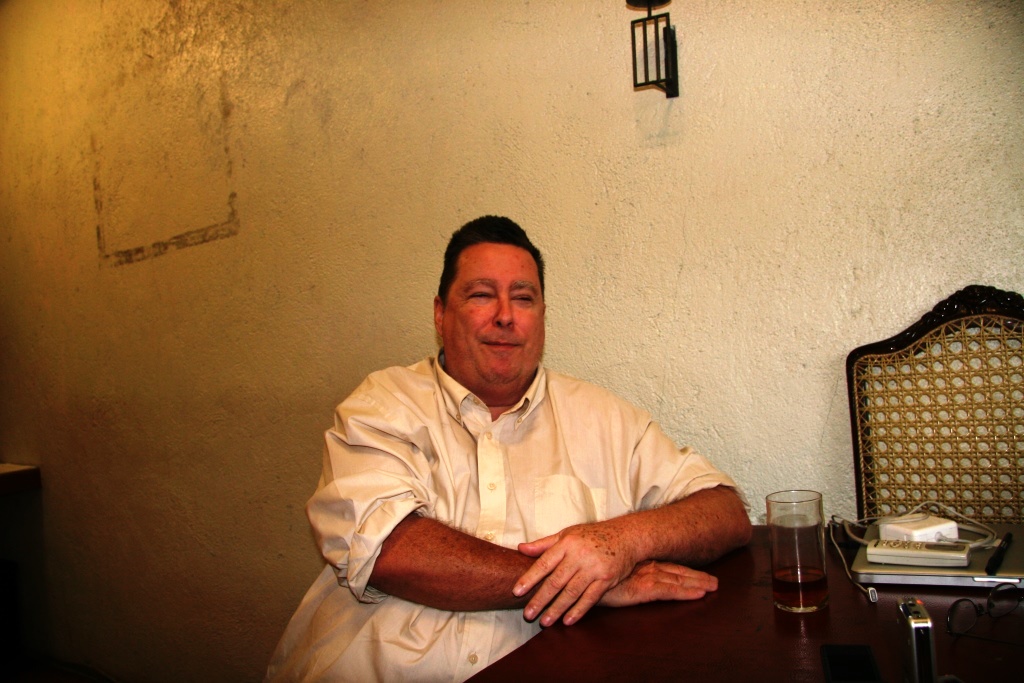
Editor’s Note: Carmelite priest Father David Blanchard never deviated from that initial tug of passion he felt to serve in this capacity from the time he was a young boy. His education and training have been the perfect combination for his role in what he refers to as “anthropologist missiologist” in El Salvador.
Add to that a few of his many other roles he wears include the host of responsibilities required as parish priest, author of many articles and books, coordinator of countless relief and social efforts, administrator of orphanages and cultural arts program, not to mention finding himself called into the position as a mediator in an international incident involving a trio of a Mohawk indigenous delegation traveling back to Canada from Bolivia on Haudenosaunee passports that became stuck in the San Salvador airport on legal issues! Each and every role he assumes centers around his obligation to empower people.
It was when I was in sixth grade reading about a Carmelite priest serving in Peru doing earthquake relief that something began to stir within me. I was born on December 1, 1950, in Greenfield, Massachusetts, in the western part of the state. My parents died within fifteen months of one another when I was nine years old. When I was thirteen, I went to a seminary for Carmelites. My siblings view me as strange and exotic. While they are believers, they are not necessarily practicing Roman Catholics. However, they are supportive of me.
My degree from the University of Massachusetts is in Philosophy and Anthropology. I went on to the University of Chicago to study Cultural Anthropology doing my field work within a small community in Canada of Mohawk Indians who were part of the Carmelite Peace and Justice Commission. Back in the States that interest helped introduce me to the dynamic personality of Father Tracy O’Sullivan, who worked successfully in the inner cities of both LA and Chicago. Father O’Sullivan was an activist in the 1960’s working in the ecumenical movement with gangs in Chicago’s south side when I met and interned with him as the director of Peace and Justice Commission. He quickly became my mentor.
Father O’Sullivan received some grant money and asked me to join him to travel to El Salvador in 1986 during the country’s civil war. We were interested in seeing what another priest we both greatly admired, Father Peter Hinde, co-founder of CRISPAZ [Christians for Peace in El Salvador], was doing there. [Father Hinde had been committed to serving the poor since living in Peru and being exposed to the early thinking of liberation theology in 1966.] We visited the CRISPAZ sites, and right across the road was the refugee camp. It was raining, the road was in bad condition, and I remember thinking to myself that I could never live in this country.
Here I am twenty-five years later, responsible for that specific property which used to be part of that very same Calle Real Refugee Camp. When the refugees returned to the area, they called it San Jose Calle Real. At the end of our visit, we met with the archbishop. He explained that there were two Sisters of St. Joseph Peace nuns in charge of the camp. One was named Andrea and the other Margaret Jane, now in Suchitoto. Although the camp was established as sanctuary for its nuns and international volunteers, the archbishop said it was very dangerous for these two women and it would be great if any of us could stay and give international presence to serve as a buffer. Many people had excuses why they could not stay. When it came to my turn, I said I did not know Spanish and explained that I was a professor for three months a year and would require permission from my provincial. The archbishop wanted my provincial’s name, address, and phone number.
My provincial at Washington Theological University in D.C. where I taught quickly gave permission to do this work at the refugee camp, and I arrived in 1987. For the next twenty years I did the part-time teaching and part-time walking in solidarity with the Salvadoran people. I regarded it a huge trust by both parties involved to be a pastor for nine months a year and away to teach the other three months. It actually worked out well for all involved. El Salvador became the natural extension of the classroom for my American students to come and learn about the situation of the people. The time away from El Salvador provided me with time to reflect and refresh myself. There were only two criticisms of me by the Salvadoran archbishop in twenty years when they did the annual evaluations. One was that I was too demanding. The second was that I was only here nine months a year and needed to be here twelve months. I would think to myself, if I am too demanding for nine months of the year, wouldn’t it stand to reason, that if I’m here for twelve months, I’m going to be that much MORE demanding? But I came to believe that they really preferred getting the results they did to provide life to the families. It gave them a longer satisfaction, and we have had a nice relationship through this continuity.
I recognized my experiences in El Salvador as enriching in terms of my career. I found myself lecturing and writing about the situation in El Salvador under a pseudonym, Daniel Santiago. The Harvest of Justice – the Church in El Salvador 10 Years After Romero [1993] is one of my books. It was too dangerous for me to use my real name because priests were being expelled from the country at the time. I was in a very volatile location being out in the country writing about topics like death squads.
A college colleague of mine, Father Joseph Donders, who served in Africa and authored more than forty books, offered me insightful advice. “I think you have found your vocation to mission.” It was true. This quasi-parish had needs that required a full-time priest to develop them. About the same time, 1992, the archbishop asked me if I would be their full-time pastor. We were now in the midst of the Peace Accords which was a serious challenge. I accepted the role.
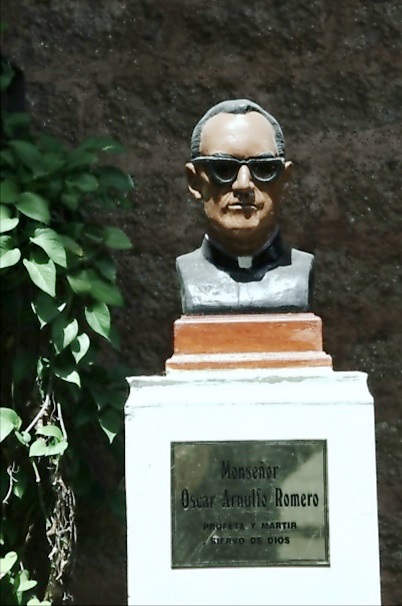
In 1995 when the people of this area re-constituted the church as a parish, the biggest concentration of people in the country were located right here. The mayor refused to apply for re-settlement and re-construction funds because he was in the ARENA political party and claimed this was not located in a conflict zone. Therefore, the church ended up being the principal agency of all development, including building the infrastructure of roads, bridges, water, electricity, and homes.
From those basic essentials we have continued to branch out into providing a myriad of social needs by developing the pastoral console of Calle Real as an all inclusive agency of development from 1992-1996. As of last year these efforts included 250 NGOs providing assistance with such familiar programs as “Food for the Poor”, where shoes, food, transportation vehicles, medicines, educational materials, and micro-loans have been provided. We have worked cooperatively with small communities and individual Lutheran pastors on some of these projects.
Our Lady of Lourdes here in Calle Real is the main parish of a community of 40,000 persons which covers 24,000 square kilometers and three towns: Calle Real, Cabanas and San Laureano. There are seven different chapels within our parish. Therefore, organization of the various ministries is vital. We have established a zero tolerance policy for discrimination in our parish. The gay community is welcome and thriving here; such acceptance is atypical in this machismo environment. I assure troubled gays that there is absolutely no place in the Bible that says a person has sinned because he/she is gay. Society here also mistreats women. A husband believes if his wife is not up at 4 AM making breakfast, washing his clothes, and everything else needed to survive, she is failing him. You need to address the situations concretely and need to speak to the reality these people live.
I am well aware of my strengths as well as the areas that challenge me and have learned how to deal with them. I am very strong on strategic planning/looking at the future and goal setting. However, I may not be a good judge of character. Often I become too impressed by a person, so I trust others to make the decisions as to who will carry out the programs which we start. What I do is surround myself with people who can make those decisions and can delegate.
I reflect on my template within my Carmelite vows of harmony, chastity, and obedience in any decisions regarding the parish. In our Carmelite Constitution we are responsible to work with all the people of our parish through empowering them rather than dominating them. My first responsibility was to empower people to take responsibility while remembering that they were just coming out of refugee camps. An option for the poor includes an option for the women to assume leadership roles of responsibility. We needed to infuse in that the contemplation of prophetic work because within the Carmelite tradition we believe God speaks to every man and every woman in the Nada, the nothing. The search for Nada is the search for nothing. This differs from Jesuit thinking and exercises. It is not meditation, but contemplation. Carmelites feel it is only when one can cultivate that sense of nothing within, that vacuum, that God can fill you. Its roots go to the third chapter of Mark when Christ retires in the desert alone –with others.
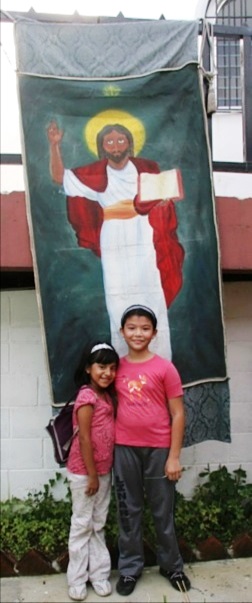
I believe strongly in the framework of the Catholic Church, including the Pope. I personally believe that the more Catholics profess their beliefs and don’t automatically practice their culture, the stronger the church becomes. The church is strong here because it practices faith and does not promote culture. Individual issues such as birth control, euthanasia, capital punishment, and abortion are all consistently articulated by the Catholic Church based on its priority of life being absolute. It is not for individual rights. If a woman came to me convinced to abort, I would never waver in my commitment to save the life of the child. Nor would I use humiliation, shame, or guilt to convince the pregnant woman otherwise. As a progressive Catholic, what can be viewed as more progressive than to defend life? The church stands to care for all unwanted children. These groups include children at risk, unwanted children, migrants, and prisoners. We have $360,000 to care for unwanted children, and I can guarantee they will be fed, educated, and cared for. I oversee several orphanages, for example. One of my responsibilities is to attend to persons who do not receive attention in the parish.
Parish to me is a community of communities and movements. I see my tasks as; 1) being the pastor; 2) being the administrator of the sacraments of the church which I cannot delegate to anyone else; 3) being the administrator of temporal goods of the church which I CAN delegate to an administrator, but then I need to have an accountant and an auditor who has to make sure that that person is not stealing; 4) being the reconcilor of conflicts. Sometimes people invest so much of themselves in what they do but we often confuse our egos with our gifts so I need to try to open everyone to reconcile. 5) empowering laity. My job is not to stop people from receiving salvation. It’s not to put obstacles in the road; it’s to help them overcome the obstacles that exist.
There are four pillars of primary evangelization within the church: baptism, preparation for reconciliation, preparation for Communion, and Confirmation. I asked someone to serve as the coordinator of primary evangelization. Then we did something no other parish did. Once the kids were in the preparation for Confirmation program, we asked them to make a commitment to the church for life. We don’t want them to view Confirmation as the end of the process in their church formation. We formed another parish of young people that is a parallel parish to this parish. It has 354 young people in it. I run it through an adviser who has a council of youth that I act as an advisor to. They are in family ministry and charismatic renewal and are very committed Christians. Social pastoral is autonomous and has a separate coordinator and council, also. It was doing such good work that we founded the New Horizons for the Poor Foundation which works with the Food for the Poor in the US, Angels of Hope, and with 350 different organizations. Donations last year were $50 million and they do tremendous work with public and private schools, and evangelical organizations.
An evangelical group works with street kids, drug and alcohol addiction kids. It is important that people who work in areas of vulnerable care take time for themselves. The propensity for stress and overwork is so great. We started working with prison ministers to encourage them to care for themselves through spiritual direction.
A new archbishop with very different ideas came into that leadership role in 1995-1996. I took the attitude that until I personally cannot work with or for him, I am going to assume he has nothing personally against me. We never had any problems. He knew I wanted to work for the good of the people, and we were able to find common ground. Although his reputation was one of not having much emotion, when he came here for Mass, I saw him cry what seemed genuinely sincere tears.
Diversification is something we keep in mind as we search for ideas to generate jobs and funds for supporting our ministries. We have an agricultural development firm within our parish that generates income and includes the most modern pig slaughterhouse in El Salvador. On that same property is a restaurant along the highway selling its products which makes $2,000 a month to provide services to that immediate community. We also have a producing bakery, as well as a training bakery. We pay taxes on all these business endeavors. A sister parish relationship provides a substantial income a year.
Services we offer our community include an AIDS Center, a dental clinic, three medical centers, and three computer centers. We have a program to address emotional issues such as fears in children. A personal favorite project that piques my interest, perhaps because of my anthropology background, is the cultural center. (It also is the least bureaucratic to run.) It houses a donation of the largest collection of Mayan ceramics in the country. We have art festivals and an artist-in-residence program. There is a collection of graffiti art about literary figures in El Salvador. There is a school of creativity with 2,000 kids from at-risk gang areas who receive training over a three-year period. We have giant puppets and a puppet circus which are popular with all ages throughout the country.
The cornerstone of my week is Sunday night at 6 PM when I have dinner with David Cartegena, whom some people refer to as my son. I’ve known David since he was ten years old and was one of the “mosquitoes” always buzzing around here. On Wednesday nights I have a standing time out with his brother, Educardo. They force me to take a break from myself.
It’s only been six months since I accepted my new role within the archdiocese as vicariate. I find it both energizing and a big challenge to re-engineer the role. It is a three-year position involving setting policies and procedures, working on independent financing, and working in the human rights office to be a voice for the voiceless. At the same time I work within this role, I feel it would be best for a Salvadoran priest to assume this position. My Spanish is horrible, and the position requires speaking on behalf of the church on social issues.
Sometimes one has wake-up calls regarding human fallibility. Given my biological genetics for early death, I’m aware I need to be cognizant of my health. I knew I’ve had a heart murmur since I was a kid. Living in the refugee camp years ago with its lack of hygiene, I developed diptheria. After I had malaria (four times; worst being in Panama) and hepatitis and the chloroquine wasn’t cleaned out of my system by the liver, it dumped into my pancreas, which gave me diabetes. After the last time in 1999, the doctors told me that in five years I would need a heart valve replacement. Sure enough, in 2004 I had the first and five years later had the second. Then I got an infection and had to have a second one done. The valve they took from me had become a stone. When I had the catheter, it was a scary procedure, and when I came back here and was walking from my house to the church to call my sister, the kids all gathered around grabbing onto my leg and said, “We’re praying for you, Father David.” It unleashed such emotion that I came here to the office and closed the door and decided that this is where I needed to have that operation and all other medical procedures. I need to be in the midst of those innocent, concerned, praying children who were giving me strength and support. It was really a conversion moment for me.
Writing is something I have enjoyed dabbling in for many years and see myself getting more serious about as I get older. I just finished a 600- page historical novel trilogy of historical sequence dealing with the founding of the Carmelites in the 16th century. The first, Raphael, applies philosophical anthropology. Simon, the second in the series, applies social analysis; Eduardo applies psychoanalysis. Entwined in the novels are the bloody events of the Third Crusade, a fascinating time for the Church of England. The research on this led me on many different levels including peasant revolt and corruption.
I write many articles and just completed one in our archdiocese newspaper on “Memory and Forgetting” based on the importance of historical memory. I feel a need to do everything possible to reinforce and support what has already been done to preserve the stories written for the sake of human rights. There is a record of what the church suffered comprising 300 linear meters of archives during the conflict. Maria Hernandez deserves much of the credit for the work done to this point. My dream is to create a new infrastructure for those items in the center of the city that would be a place of the world. I would like to convince the archbishop to build this on existing property. Besides displaying the archives, it would be a living active site for supporting human rights. For example, it could provide ongoing free legal consultations for the poor and a free legal library for the poor to use.
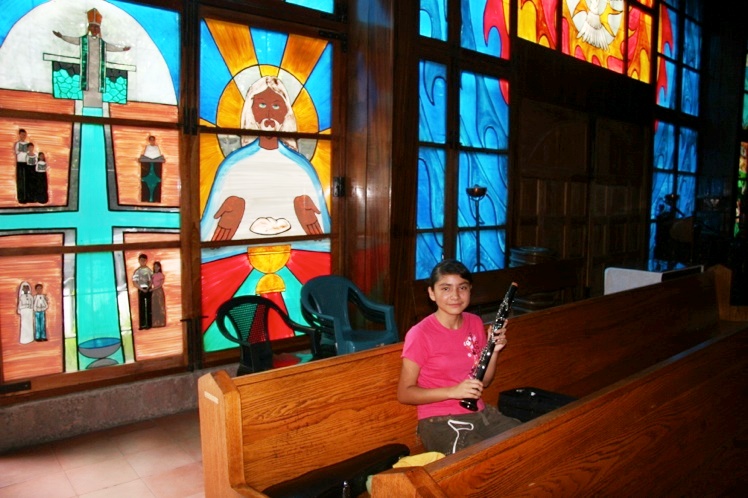
A young musician inside chapel of Our Lady of Lourdes
El Salvador has some big issues to address. Right now the biggest challenge is the mining issue in Cabanas. It is not just an environmental issue but a constitutional challenge which is a social issue for all of Central America. Another problem for the country is that El Salvador has no product. There is only labor which now can be undersold in other parts of the world. There was a poll of youth ages 17-24 which said 75% wanted to leave the country. How do you build hope for a country when 3/4 of them just want to leave? Doctors are emigrating to an unwelcome U.S. to work as orderlies – IF they can even get there, and reaching their ceiling very fast. It’s very troubling.
The gangs threaten society in general. They have their own structure. They even have their own government, so it’s a government within a government. The result is that a lot of their own people are killed. The vitality involves a great deal of recruiting, so if you want to cut it off, you cut it off at the source which is now at the 11- and 12- year- old level or 4th, 5th, and 6th grade. At that age the frontal cortex of the brain requires much stimulation, and rebelliousness is common. In places such as the U.S., we deal with that age bracket by providing alternatives where the kids can identify themselves to address those needs and identify themselves in a unit beyond their family such as in church activities and sports. If you don’t have those options, they will seek out other avenues, and that is where the gangs are ready to recruit. How do you eliminate that negative influence? We are working on raising consciousness. Longevity of commitment for one thing is something we try to point out; once they join a gang, they have no options to ever leave, and they are in it til they are killed by fellow gang members or rival gangs. Pointing out the tiny enclaves the gangs exist in without options is another consideration many youth do not realize. They can never get a job, see their family, have other friends, go to church; they are stuck. We also try to portray them as creeps, not glamorous.
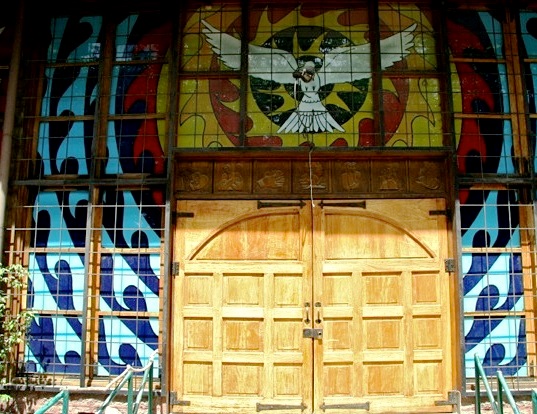
Yet, despite that blemish on the country, there is a mystique here that keeps people like Gene Palumbo, Dean Brackley [since deceased], other Americans like myself, and keeps people like you coming back. There is something about it- a mystique that, despite the trash in the city, the water, the busses breaking down, the risky environment, the violence, the disappointment of the President, there is something that rises above it all, and it is just the mystique of the people. Maybe there is something about being the smallest Central American country and being the runt. You have to avoid the tendency to romanticize El Salvador. It’s just hard to put your finger on what it is, but there is something different between a Salvadoran and a Honduran. Guatemala has wonderful traditions, but that is not IT. Being an anthropologist, I see something different that you just do not detect in the other countries.


